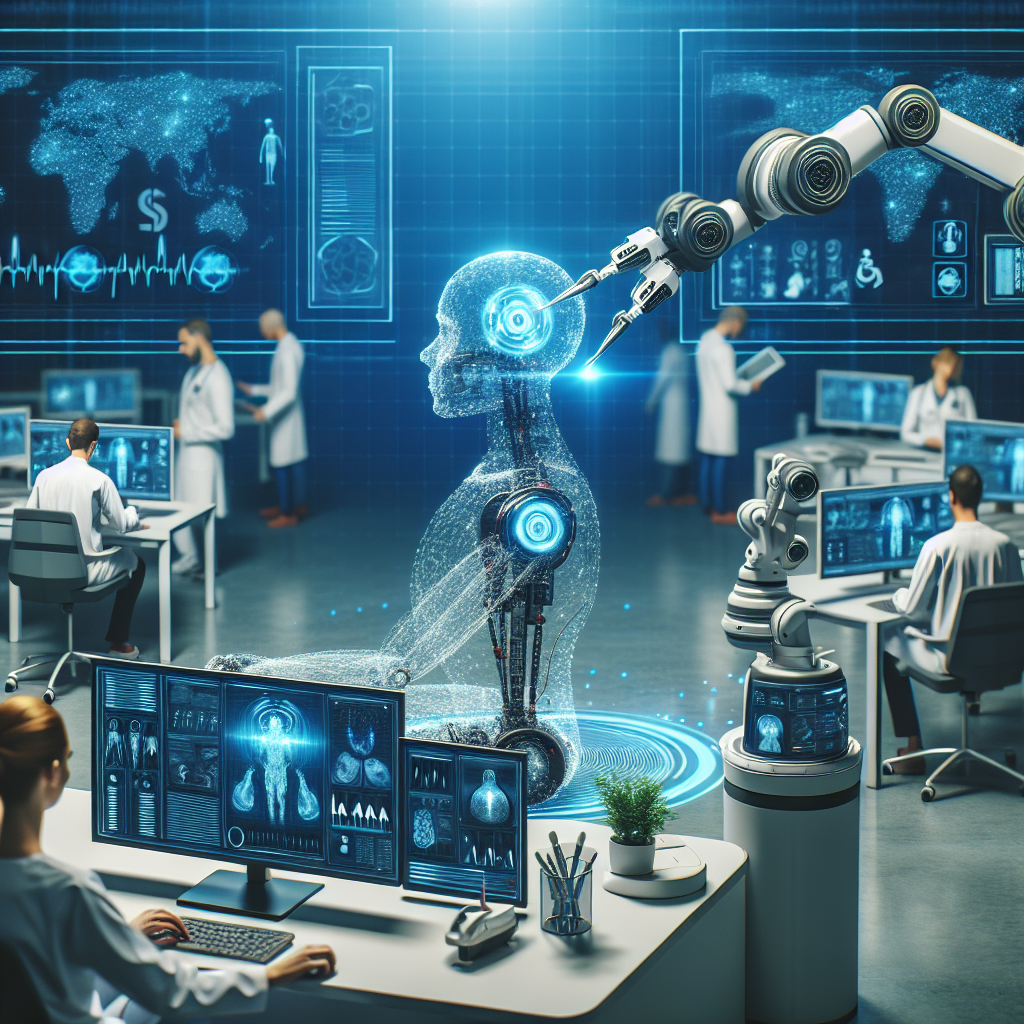The Future of AI in Healthcare Diagnostics
Artificial intelligence (AI) has been making waves in the healthcare industry, especially in the field of diagnostics. AI has the potential to revolutionize the way diseases are diagnosed and treated, leading to more accurate and efficient healthcare outcomes. In this article, we will explore the current state of AI in healthcare diagnostics and the future possibilities that this technology holds.
Current State of AI in Healthcare Diagnostics
AI has already been successfully implemented in various healthcare settings, including diagnostic imaging, pathology, and genomics. One of the most notable applications of AI in healthcare diagnostics is in medical imaging interpretation. AI algorithms have been developed to analyze medical images such as X-rays, CT scans, and MRI scans, helping radiologists to detect abnormalities and diagnose diseases more accurately and efficiently.
AI has also been used in pathology to analyze tissue samples and identify cancer cells. By training AI algorithms on large datasets of pathology images, researchers have been able to develop systems that can detect cancer cells with high accuracy, potentially reducing the need for invasive biopsies and improving patient outcomes.
In genomics, AI has been used to analyze genetic data and identify patterns that are associated with specific diseases. By analyzing large datasets of genetic information, AI algorithms can help researchers to identify genetic markers that are linked to diseases such as cancer, diabetes, and Alzheimer’s, leading to more personalized and targeted treatments.
Future Possibilities of AI in Healthcare Diagnostics
The future of AI in healthcare diagnostics holds immense potential for improving patient outcomes and reducing healthcare costs. Some of the key possibilities include:
1. Early Detection of Diseases: AI algorithms have the potential to detect diseases at an early stage, before symptoms manifest. By analyzing vast amounts of data from various sources, including medical images, patient records, and genetic information, AI systems can identify patterns that are indicative of disease, allowing for early intervention and treatment.
2. Personalized Medicine: AI can help to tailor treatments to individual patients based on their unique genetic makeup, lifestyle factors, and medical history. By analyzing a patient’s data, AI algorithms can recommend the most effective treatment options that are tailored to their specific needs, leading to better outcomes and fewer side effects.
3. Predictive Analytics: AI can be used to predict patient outcomes and identify individuals who are at risk of developing certain diseases. By analyzing data from electronic health records, wearable devices, and other sources, AI systems can identify patterns that are associated with disease progression and help healthcare providers to intervene early to prevent complications.
4. Remote Monitoring: AI-powered devices and sensors can be used to monitor patients remotely and alert healthcare providers to any changes in their condition. By analyzing real-time data from wearable devices, AI algorithms can detect abnormalities and notify healthcare providers of potential issues, enabling timely interventions and reducing hospital admissions.
5. Drug Discovery: AI can accelerate the drug discovery process by analyzing large datasets of molecular and genetic information to identify potential drug targets and predict the efficacy of new drugs. By using AI algorithms to screen potential drug candidates, researchers can identify promising compounds more quickly and efficiently, leading to faster development of new treatments.
FAQs
1. How accurate are AI algorithms in healthcare diagnostics?
AI algorithms have been shown to be highly accurate in healthcare diagnostics, often outperforming human experts in tasks such as medical imaging interpretation and pathology analysis. However, the accuracy of AI algorithms can vary depending on the quality of the data used to train them and the complexity of the task at hand.
2. Will AI replace human healthcare providers in diagnostics?
While AI has the potential to assist healthcare providers in diagnostics and improve the accuracy and efficiency of disease detection, it is unlikely to replace human healthcare providers entirely. AI algorithms can augment the capabilities of healthcare providers by providing them with additional information and insights, but ultimately, human judgment and expertise will still be needed to make treatment decisions and provide personalized care to patients.
3. How is patient data protected when using AI in healthcare diagnostics?
Patient data privacy and security are of utmost importance when using AI in healthcare diagnostics. Healthcare providers and technology companies must adhere to strict regulations and protocols to ensure that patient data is safeguarded and used responsibly. This includes implementing encryption, access controls, and secure data storage practices to protect patient information from unauthorized access or misuse.
4. What are the potential challenges of implementing AI in healthcare diagnostics?
Some of the potential challenges of implementing AI in healthcare diagnostics include the need for high-quality data to train AI algorithms, regulatory hurdles, and concerns about the ethical implications of using AI in healthcare. Additionally, there may be resistance from healthcare providers who are wary of adopting new technologies and changing their established practices.
5. How can healthcare providers prepare for the future of AI in healthcare diagnostics?
Healthcare providers can prepare for the future of AI in healthcare diagnostics by investing in training and education for their staff, collaborating with technology partners to implement AI solutions, and staying informed about the latest developments in the field. By embracing AI technology and integrating it into their practices, healthcare providers can improve the quality of care they provide to patients and stay ahead of the curve in an increasingly technology-driven healthcare landscape.
In conclusion, the future of AI in healthcare diagnostics is bright, with the potential to revolutionize the way diseases are diagnosed and treated. By leveraging the power of AI algorithms to analyze vast amounts of data and identify patterns that are indicative of disease, healthcare providers can improve patient outcomes, personalize treatments, and reduce healthcare costs. As AI technology continues to advance and become more integrated into healthcare settings, the possibilities for improving diagnostics and patient care are endless.

